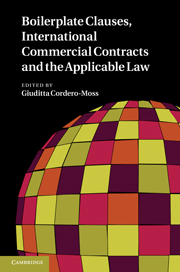Book contents
- Frontmatter
- Contents
- List of contributors
- Preface
- Introduction
- PART 1 How contracts are written in practice
- PART 2 Methodological challenges
- PART 3 The applicable law's effects on boilerplate clauses
- Introduction to Part 3
- 7 The common law tradition: application of boilerplate clauses under English law
- 8 The Germanic tradition: application of boilerplate clauses under German law
- 9 The Romanistic tradition: application of boilerplate clauses under French law
- 10 The Romanistic tradition: application of boilerplate clauses under Italian law
- 11 The Nordic tradition: application of boilerplate clauses under Danish law
- 12 The Nordic tradition: application of boilerplate clauses under Finnish Law
- 13 The Nordic tradition: application of boilerplate clauses under Norwegian law
- 14 The Nordic tradition: application of boilerplate clauses under Swedish law
- 15 The East European tradition: application of boilerplate clauses under Hungarian law
- 16 The East European tradition: application of boilerplate clauses under Russian law
- Conclusion: the self-sufficient contract, uniformly interpreted on the basis of its own terms: an illusion, but not fully useless
- Bibliography
- Index
7 - The common law tradition: application of boilerplate clauses under English law
from PART 3 - The applicable law's effects on boilerplate clauses
Published online by Cambridge University Press: 11 April 2011
- Frontmatter
- Contents
- List of contributors
- Preface
- Introduction
- PART 1 How contracts are written in practice
- PART 2 Methodological challenges
- PART 3 The applicable law's effects on boilerplate clauses
- Introduction to Part 3
- 7 The common law tradition: application of boilerplate clauses under English law
- 8 The Germanic tradition: application of boilerplate clauses under German law
- 9 The Romanistic tradition: application of boilerplate clauses under French law
- 10 The Romanistic tradition: application of boilerplate clauses under Italian law
- 11 The Nordic tradition: application of boilerplate clauses under Danish law
- 12 The Nordic tradition: application of boilerplate clauses under Finnish Law
- 13 The Nordic tradition: application of boilerplate clauses under Norwegian law
- 14 The Nordic tradition: application of boilerplate clauses under Swedish law
- 15 The East European tradition: application of boilerplate clauses under Hungarian law
- 16 The East European tradition: application of boilerplate clauses under Russian law
- Conclusion: the self-sufficient contract, uniformly interpreted on the basis of its own terms: an illusion, but not fully useless
- Bibliography
- Index
Summary
Introduction
The majority of this chapter is taken up with an analysis of how English law regulates the types of clause that are the principal focus of this book. Before that analysis can be undertaken, it is necessary to make a few preliminary observations about the general approach of the courts to the policing of ‘boilerplate’ clauses.
Content
Freedom of contract remains the core principle at the heart of the English law of contract. The content of a contract remains almost entirely in the hands of the parties to it. There are few ‘default’ provisions which will be included in the absence of any express agreement of the parties. Prominent examples are the terms implied by statute in contracts for the sale of goods that the goods will comply with any description, or sample, and will be of ‘satisfactory quality’ and ‘fit for purpose’. Such terms will often be excluded by the contrary agreement of the parties, so that it is ultimately the intention of the parties which prevails. In some instances, the parties may be quite happy to rely on the minimal content supplied by the operation of law, e.g., some building contracts, particularly in the residential context, may be entirely oral, or at the very least will remain informal and contain no more than the express obligation of the employer to pay the price and the implied obligation of the contractor to carry out the work with reasonable skill and care.
- Type
- Chapter
- Information
- Publisher: Cambridge University PressPrint publication year: 2011



